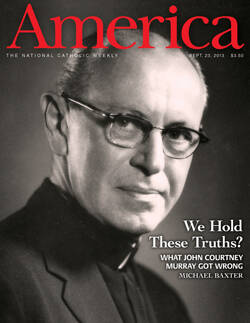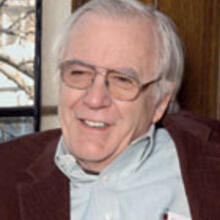In this guest blog post, David J. O’Brien responds to “Murray’s Mistake,” by Michael Baxter (9/24). Professor O’Brien taught American Catholic history for nearly 40 years at the College of the Holy Cross in Worcester, Mass., and most recently served as a visiting distinguished professor at the University of Dayton in Dayton, Ohio.
There is some wisdom in Michael Baxter’s critique of John Courtney Murray, S.J. Father Murray’s careful formulas for American Catholic citizenship did presume consensus, civility and a willingness to dialogue about differences—all now missing in American public and religious life. Many Catholics of Father Murray’s day grew impatient with his overly cautious approach to race, Vietnam and nuclear weapons. Murray thought he spoke with civilized people, and he had little use for prophets. He would surely have trouble adjusting to the cultural politics that emerge when people fear or hate each other, as in embattled parts of the world, or when they disagree profoundly, as we do, about what Christian discipleship and responsible citizenship require.
Professor Baxter’s guru Alasdair McIntyre, who loves natural law even more than Father Murray, thinks that in the absence of consensus, politics is just another way of war. The only option, well stated by Professor Baxter, is to turn our backs on doomed efforts to share historical responsibility with all those not very well-educated others. To their credit Professor Baxter and his Catholic Worker friends live, often courageously, by those beliefs. They turn Gospel imperatives into personal commitments, hospitable communities and resistance not just to the state but to all those terrible things good Christians dislike about the world, especially the American world.
Father Murray, to his credit, thought that the American world was now ours, like it or not, and we Catholics had best figure out how to share responsibility for that hard won fact. Those who came after him found that the common good—in an ever-more interdependent, well-armed and ecologically endangered world—could not await reasonable agreements among the supposedly civilized. Father Murray’s far from uncritical disciples, like the Rev. J. Bryan Hehir and David Hollenbach, S.J., mentioned in Professor Baxter’s essay, work hard to connect Father Murray’s natural law dualism with Gospel-affirmed imperatives of peacemaking and justice seeking. And many others, of different politic stripes, have tried just as hard to find pastoral strategies to draw people more deeply into, not away from, American economic, social, cultural and political life. That work goes on not because they foolishly think they can make history by gaining power, as Professor Baxter somewhat righteously suggests. Instead they, and I, think that our families overcome poverty, discrimination and marginalization so that we could share responsibility for our communities and our country.
American Catholics before us took chances that they could make at least a little history, and they did. The question American Catholics now face is whether those who are poor among us should also take the risk of becoming history-making agents and whether those no longer poor can make good use of the opportunities and resources that have come with family liberation. Some, with Professor Baxter and Dorothy Day, will answer “resistance.” Others, like Leon E. Panetta, Rep. Paul Ryan and “Nuns on the Bus,” will give Father Murray’s answer of “engagement.” And, if we are really Catholic, we will talk about our serious differences and then find ways to embrace one another in the solidarity of our church, a sacrament, somehow, of the unity we desire and God intends.








